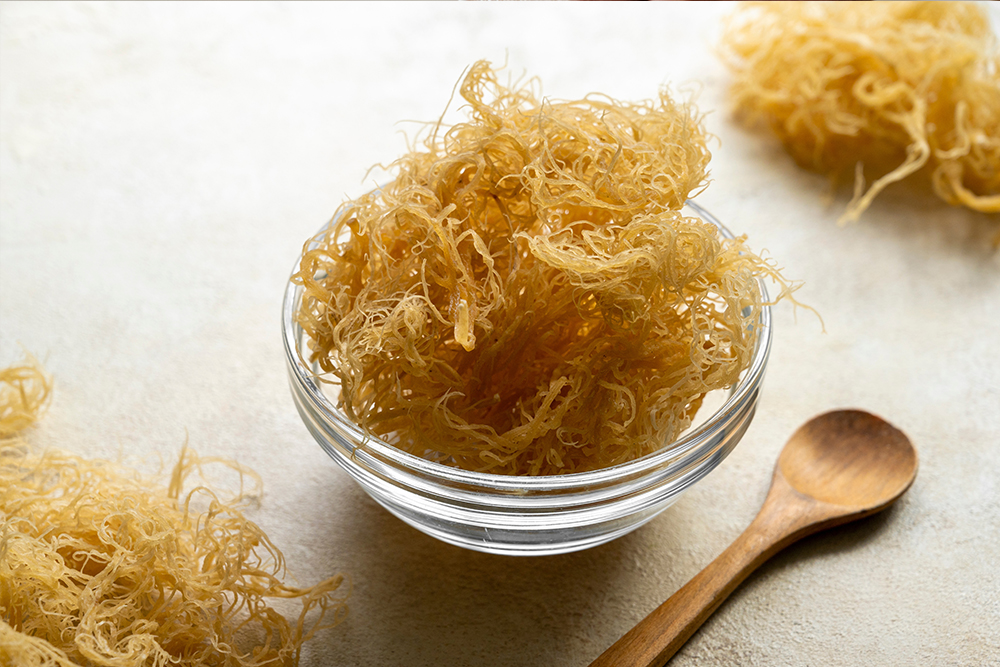
01 Mar All You Need to Know About Sea Moss
Most of us in the world of wellbeing have heard about sea moss – there has been nothing short of a buzz in recent years regarding the nutrient density this phenomenal marine vegetable offers.
Also known as Irish Moss, this medicine is a collection of different kinds of seaweeds that contain the same medicinal, nutritive, and overall benefits. A few species belong under the term ‘sea moss’, such as Chondrus crispus, Eucheuma Contonii and Gracilaria, each specific to different regions and marine climates.
Chondrus crispus is a red algae which grows abundantly along the rocky coastlines of the Atlantic and Pacific oceans – some of the most well-known and notable shorelines being those in the Caribbean, Java, Europe and along the British Isles. This humble little seaweed looks somewhat like a red leaf of lettuce but comes in various colours, including yellow, green, purple and maroon.
HISTORY
There is evidence that Irish sea moss has been used as a medicine and nutritional ally in China dating back as far as 600-400 B.C.
The name ‘Irish moss’ isn’t due to where the seaweed comes from but rather has a far more intricate and relational story: During the Potato Famine in the 1840s, the entire Irish population faced catastrophic disease and starvation, which continued for almost a decade. Due to this, people turned to what is commonly referred to as ‘famine foods’ – it was then that the Irish peoples discovered sea moss as a phenomenally nutritious and sustainable food source, allowing for them to not only have a source of food and nutrients but also consume an incredible medicine to keep them disease free.
AS A MEDICINE:
“[Sea moss] is rich in iodine, among other vital nutrients. As a result, it may offer health benefits including improved heart health, improved blood sugar regulation, and reduced risk of cancer,” says Kristin Gillespie, RD, who is based in Virginia Beach, Virginia.
Nutrient, vitamin and mineral dense, sea moss contains 92 of the 102 essential minerals which we need daily to promote and aid in maintaining health. In addition, it provides a whole food source of calcium, iron, magnesium, phosphorus, zinc, copper and iodine, a micronutrient essential for the health of the thyroid. It is also rich in amino acids, Vitamins A and C and omega-3s.
It is also a wonderful source of antioxidants that protect the body from the negative side effects of oxidative stress and damage on organ tissues and cells.
It contains a powerful amount of primary metabolites which promote mucilage – this thick substance is water soluble and, therefore, easily processed by our gut microbiome. When digested, this mucilage travels through the bloodstream, providing skin elasticity, joint support, healthy digestion, and even easing a sore throat. In addition, these chemical constituents are also beneficial in improving immune response and facilitating wellbeing.
Other health benefits include thyroid support which in turn aids in balancing endocrine function and weight management, modulation of immunity, supports the metabolic process, reduces cholesterol levels and supports cardiovascular health and blood sugar levels and traditionally has been used to improve fertility.
Topically it aids in easing eczema, acne, and psoriasis and can promote skin elasticity and even tone. It is also used as a hair treatment to bring moisture and softness.
The U.S. Department of Agriculture lists the following nutrition facts for 2 tablespoons (tbsp) of sea moss:
- Calories: 5
- Total fat: 0.02 grams (g)
- Protein: 0.2g
- Carbohydrates: 1.2g
- Dietary fiber: 0.13g
- Sugars: 0.06g
- Calcium: 7.2 milligrams (mg)
- Iron: 0.89mg
- Magnesium: 14.4mg
- Potassium: 6.3mg
- Vitamin A: 0.6 microgram (mcg)
- Vitamin C: 0.3mg
- Vitamin K: 0.5mcg
Sea moss’ most well-known and celebrated chemical constituent is Carrageenan which has been used in cosmetics for many years for its moisturising and beautifying effects – however, it is additionally an incredible antiviral, antibacterial, heart supportive, anti-tumour, anti-hyperlipidemic and assists in the modulation of the immune response.
MAKING SEA MOSS – The traditional way
Along with adding to your smoothies or sprinkling over your salads, this incredible medicine has some exciting applications for internal and external preparations.
DRINK:
Ingredients
- 2 tbsp sea moss gel (see below)
- 1 ¼ cups mylk of choice
- Sweetener of choice (dates, honey, coconut sugar etc)
- ½ tsp vanilla extract
- ½ tsp ground cinnamon
- ¼ tsp ground nutmeg
- ¼ tsp cardamom
- Some suggested allies: Pine pollen, Shatavari, Maca, Mucuna, Gokshura, Eleuthero
- Add all ingredients to a blender and mix until smooth.
GEL:
Method
Take 1 part sea moss (1Tbsp) to 4 parts water and allow to sit for 12-48 hours.
METHOD 1: Add to a blender until the liquid is smooth, and refrigerate.
METHOD 2: Add another 4 parts water and pour sea moss mixture and water into a pot – allow to simmer for 5-15 minutes on low heat. Once cooled, either strain or blend and refrigerate.
How to use sea moss gel?
- Put it in a smoothie
- Freeze in ice blocks and add to your water
- Make a face mask with other ingredients such as Triphala, turmeric and essential oils
- Use it as a binder in ingredients
- Give it to your plants
- Put it in your hair
(Source: Aether )



No Comments